 When a patient is missing a tooth or multiple teeth, dental implants are an excellent option for restoring smiles. We’ve used dental implants quite a bit at our Jackson dental care center, achieving excellent results each time.
When a patient is missing a tooth or multiple teeth, dental implants are an excellent option for restoring smiles. We’ve used dental implants quite a bit at our Jackson dental care center, achieving excellent results each time.
Of course, there are many issues that can cause failure of dental implant treatment. One such problem we’d like to discuss right now is gum disease.
About Gum Disease
Gum disease (also known as periodontal disease) is a bacterial infection of the gum tissue. When gum disease occurs, it weakens and inflames the gum tissue. There are three stages of gum disease:
- Gingivitis
- Periodontitis
- Advanced periodontitis
In the earliest stages of gum disease, a person’s gums become irritated and discolored. In later stages of gum disease, the gum tissue may recede and expose more of the root structure of a person’s teeth. In addition, a person’s teeth may come loose and shift out of their original position. It’s possible to lose teeth as a result of advanced gum disease, and for the infection to spread from the gum tissue to other parts of the mouth, such as the jawbone.
How Gum Disease Affects Newly Placed Dental Implants
If you have recently undergone oral surgery to have dental implants placed, you will want to do whatever you can to prevent gum disease from occurring. Gum disease can potentially lead to implant failure, especially in the early months of healing.
During the first months of recovery, the dental implant must fuse with the jawbone. The process is known as osseointegration. Only when osseointegration has been completed will a person’s dental implants be strong enough to support a bridge or a denture.
If gum disease does not lead to total implant failure, it can lead to longer healing times, delayed treatment, or the need for corrective procedures to prevent implant failure.
How Gum Disease Affects Dental Implants That Have Integrated
If you have had dental implants for a long time and develop gum disease, you’re not in the clear. The infection will not spread to the dental implants per se, but it can cause problems to the jawbone, any remaining teeth, and the gum tissue in general. If the infection spreads, it can have a negative impact on overall implant quality. The loss of gum tissue from around a dental implant can result in problems with fit and stability as well.
Treatments for Gum Disease
There are many different treatments for gum disease if it affects you. Typically patients are given antiseptic rinses or medications, which helps control the bacteria in the mouth. Antibiotic medications may also be considered for especially advanced gum disease.
Once the infection is addressed, grafting surgery may be recommended to rebuild the gumline and restore any gum tissue that was severely unhealthy.
Tips for Gum Disease Prevention
To prevent gum disease from occurring, consider these simple preventative measures:
- Do not smoke or use any tobacco products
- Brush your teeth at least twice a day (ideally after every meal)
- Floss your teeth at least once a day (ideally after every meal)
- Visit your dentist twice a year for regular checkups
Learn More About Implant Dentistry
For more information about dental implants and how we can help you have a healthy and beautiful smile, be sure to contact our advanced dental care center today. Our team is here to help you smile with renewed confidence and improved wellness.